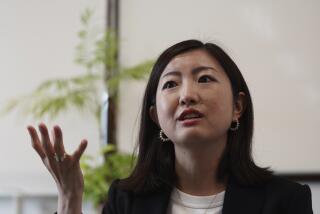Foreign Women Don’t Fare Much Better
- Share via
Foreign executive women in Japan have an easier time, but not much.
They face fewer of the outright biases against women, partly because most work for foreign firms. But still, foreign executive women are not treated the same as foreign executive men.
“There is a difference between a foreign female executive and foreign male executive. There is a lot of inequality built into the system from what I’ve seen,” explained Shirley Lichti, program manager of international marketing at IBM Asia/Pacific Group in Tokyo.
Lichti, the newly elected president of Foreign Executive Women (FEW), a group of 150 expatriate women working in Japan, said Japanese businessmen will not negotiate directly with foreign women on big deals.
Can Break Rules
“That’s why people were really shocked when Carla Hills (U.S. Trade Representative) was given the job to negotiate the Super 301” trade agreement with the Japanese. “Japanese businessmen never negotiate anything that is important with a woman. . . . This society changes slowly. It takes forever to change the mind-set.”
Still, foreign executive women receive better treatment than their Japanese counterparts because as foreigners, or gaijin, they are outside of the system and are not subject to Japanese traditions.
“Caucasian women achieve a male status in a company in Japan. They become androgynous so they are treated differently than domestic Japanese women,” explained Takie S. Lebra, a professor of anthropology at the University of Hawaii.
“We’re foreigners; we don’t fit into the cultural framework,” explained Sharman Knox, a vice president at Manufacturers Hanover in Tokyo. “We’re much more fluid. . . . We can approach much more senior people than Japanese females.”
Not being Japanese allowed Jane Waugh, who has worked in Japan twice and was one of the founders of FEW, to break some rules. When she was selling advertising for an English-language magazine, she hopped on her motor bike to make unsolicited sales calls.
“The Japanese would never do that--make cold calls--because you had to have a proper introduction,” said Waugh, who now works at Prodigy Services Co. in Stamford, Conn. “A foreigner could get away with doing strange things like that that Japanese women could not.” But she noted that when she first went to Japan in 1979, the Japanese government required a letter from her husband permitting her to work, among other documents, before issuing her a work permit.
Token Hiring
“With foreign women, the shock appeal is useful to get in the door,” explained Robert L. Sharp, vice president of Asian corporate banking at Manufacturers Hanover’s office in Los Angeles. But he added, “the bottom line is are you competent? You could be a female giraffe, as long as you’ve got the goods to produce, but whether they (the Japanese) prefer a giraffe is another matter.”
There also is some question about whether a few Japanese firms have hired foreign women in high positions as window dressing--a token symbol of internationalization. “There is a real push by Japanese firms toward internationalization, but their thinking is that hiring a gaijin will do it,” explained Lichti, whose group meets often with the Japan Assn. of Female Executives.
She said one American woman left a very prestigious Japanese firm because “they didn’t give her anything to do. She left and went to a foreign company.”
More to Read
Inside the business of entertainment
The Wide Shot brings you news, analysis and insights on everything from streaming wars to production — and what it all means for the future.
You may occasionally receive promotional content from the Los Angeles Times.










